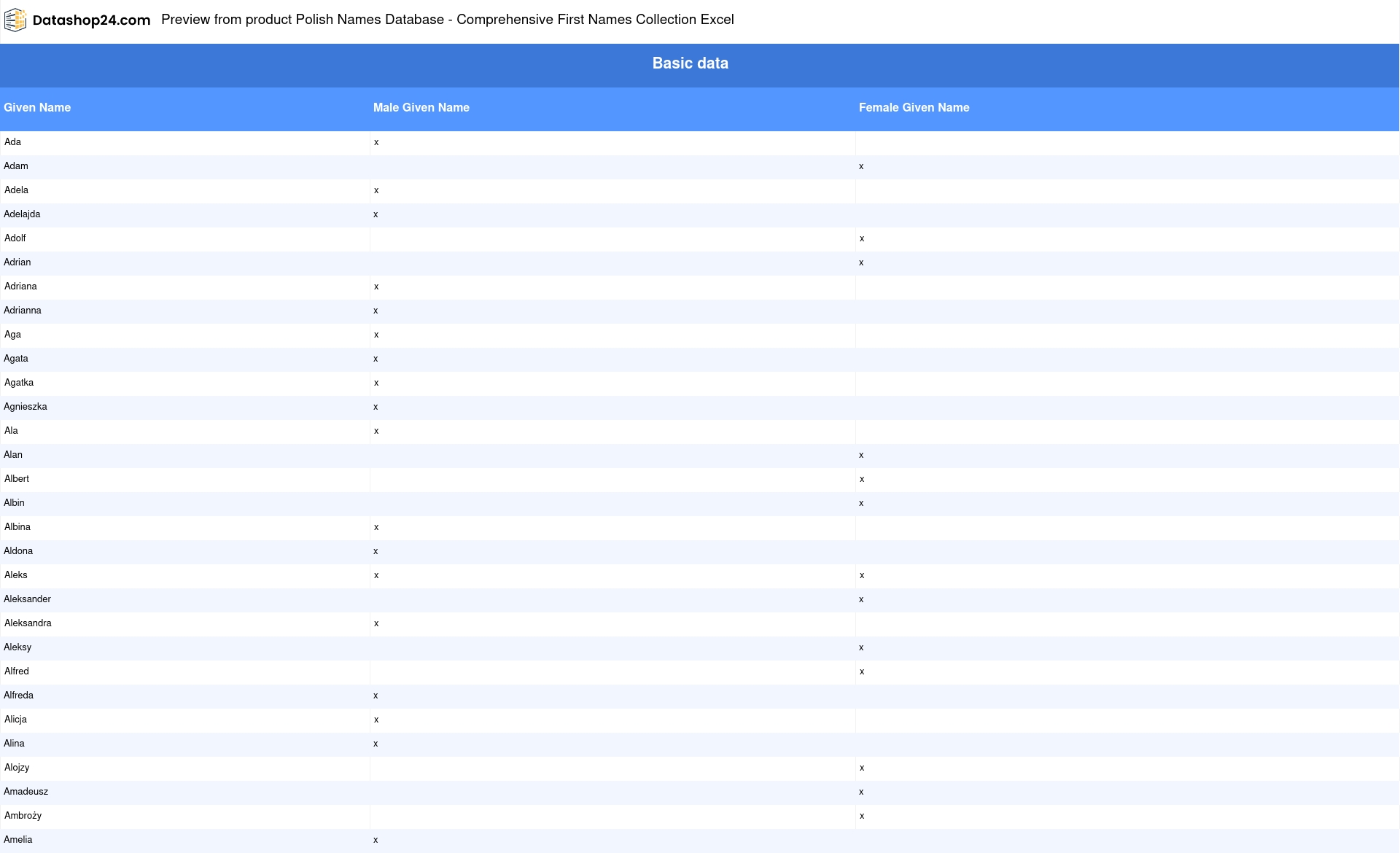Polish Names Database - Comprehensive First Names Collection Excel
Essential Database Information for Polish Names






 Up-to-date and carefully verified data
Up-to-date and carefully verified data Company-wide unlimited usage period
Company-wide unlimited usage period No waiting, immediate access after purchase
No waiting, immediate access after purchaseComprehensive Polish Names Database with Gender Classification
Our Polish names database contains 633 carefully curated first names from Poland with precise gender classification. Each entry includes the first name and its corresponding gender designation (male, female, or unisex), providing you with essential data for various applications. The database is delivered in Excel format, making it easy to filter, sort, and integrate into CRM systems, marketing tools, or other databases. Whether you're developing software applications, conducting demographic research, or creating personalized marketing campaigns, this structured dataset offers reliable reference data for Polish male names and Polish female names.
The following table provides an overview of the database structure and content:
Basic data
Advantages of Purchasing Our Polish Names Database
Acquiring a ready-made Polish names database offers significant advantages over conducting your own research, particularly when dealing with the complexities of Polish naming conventions and linguistic variations. Here are the key benefits of our professionally compiled dataset:
- Time-saving efficiency: Researching and compiling Polish boy names and Polish girl names from various sources can take weeks or months. Our database provides immediate access to a comprehensive collection.
- Cultural accuracy: Polish names follow specific linguistic patterns and cultural traditions. Our database includes authentic Polish names that reflect proper naming conventions and Polish orthography.
- Gender classification reliability: Determining gender classification for Polish names requires linguistic expertise, especially for names with complex endings or those with regional variations across different Polish regions.
- Structured data format: The Excel format allows for immediate integration into your existing systems without additional formatting or data cleaning requirements.
- Regional representation: Our database includes Polish names from different historical periods and regions, reflecting the diversity of Polish naming traditions and cultural heritage.
- Quality assurance: Each entry undergoes validation processes using modern algorithms and cultural verification to ensure accuracy and authenticity.
Useful Information and Frequently Asked Questions about Polish Names
Why do Polish names end in ski?
The "-ski" ending in Polish names is primarily found in surnames, not first names. This suffix originally indicated geographic origin or noble status, meaning "from" or "of" a particular place. While our database focuses on first names rather than surnames, understanding this naming convention helps appreciate Polish cultural heritage and family connections.
What are common Polish boy names?
Common Polish boy names include both traditional names with Slavic roots and names with religious significance. Examples include Piotr (Peter), Marcin (Martin), Tomasz (Thomas), Krzysztof (Christopher), Michal (Michael), and Jakub (Jacob). These Polish male names often have strong historical or religious connections and may have diminutive forms used in everyday conversation.
What are common Polish girl names?
Common Polish girl names encompass beautiful names with Slavic origins and religious influences. Examples include Anna, Maria, Katarzyna (Catherine), Magdalena, Agnieszka (Agnes), and Barbara. These Polish female names often have elegant sounds and may include traditional Polish forms of international names as well as uniquely Polish variations.
Fascinating Facts About Polish Names
Polish naming traditions reflect a rich cultural heritage deeply influenced by Slavic roots, Catholic faith, and historical events spanning over a millennium. Many Polish names derive from Old Slavic elements, often combining meanings related to peace, glory, strength, or protection. During different historical periods, Polish names showed various influences - medieval times brought many Latin names through Christianity, while the Renaissance introduced some classical elements. Interestingly, Poland has specific naming laws that require names to indicate gender clearly and not harm the child's welfare. Traditional Polish names often have multiple diminutive forms, with different versions used in family settings versus formal contexts. The Polish language's complex grammar affects how names change based on grammatical cases, making Polish names linguistically distinctive. Many Polish names have seasonal associations, with certain names traditionally given during specific Catholic feast days throughout the year. The solidarity movement and Poland's independence struggles have also influenced naming patterns, with some names gaining or losing popularity based on historical associations and national pride.






 Up-to-date and carefully verified data
Up-to-date and carefully verified data Company-wide unlimited usage period
Company-wide unlimited usage period No waiting, immediate access after purchase
No waiting, immediate access after purchase







